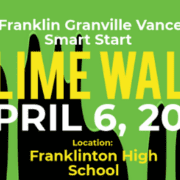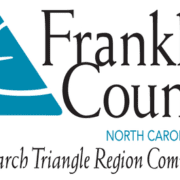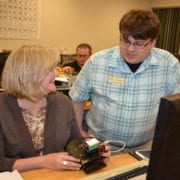Vance-Granville Community College and the Advanced Manufacturing Skills Training Alliance (AMSTA) recently partnered to hold a five-part “Rover-Bot” Workshop for area teachers. The series was held on Thursday evenings in October and November in the electronics lab at VGCC’s South Campus, where the Electronics Engineering Technology program is based.
In the workshop, VGCC Engineering Technologies program head Wesley Williams taught the educators about basic electronics and programming while they assembled a “rover” robot, a small, autonomous moving vehicle. The Rover-Bot has two battery-powered motors that move independently, so it is driven like a tank, Williams explained. “Over the course of the workshop, we built the rover and learned how to drive it with a platform called Arduino, which is basically a small computer,” Williams said. “We then incorporated sensors that would activate based on light and temperature and other features. The teachers really enjoyed the building process and the hands-on nature of the class. They said they want to incorporate what they learned in their own classrooms, so I gave them links to more information and ideas.”
According to AMSTA Project Manager Stephanie Ayers, “the goal of the Rover-Bot workshop was to expand teachers’ knowledge of robotics and enable them to sponsor robotics clubs in their school or implement project-based learning in their classroom.”
Among those who attended all or part of the series were: Beverly Spivey-Judkins from Franklinton High School; Kelly Dixon and Fred Reed, both from Granville Central High School; Marva Burrell-Smith from J.F. Webb High School (Granville County); Kevin W. Moran and Traci Branch, both from Mt. Energy Elementary School (Granville County); Audra Neunkirchner from Northern Granville Middle School; Penny Collins and Pamela Huff, both from Northern Vance High School; and Henry Bobbitt from Warren County High School. Each teacher received continuing education credits for attending.
AMSTA is a partnership involving VGCC and the public school systems in Vance, Granville, Franklin and Warren counties, who work together to prepare students in the region for careers in manufacturing. A grant from the North Carolina Education and Workforce Innovation Fund supported this workshop and other AMSTA projects. “By providing quality professional development activities that are relevant to manufacturing in our region, we increase our teachers’ ability prepare students to enter these careers,” Ayers said. “Also, by partnering with VGCC to provide these workshops, we have opened up lines of communication between K-12 teachers and community college instructors to share information and ideas about preparing students for advanced manufacturing careers.”
This was the first time Williams has conducted a project-based robotics course for schoolteachers; he offered a broader course in 2015 in partnership with AMSTA on various topics related to electronics and robotics.
VGCC offers both a two-year degree and a certificate in Electronics Engineering Technology (EET). The certificate is also available as a Career and College Promise (CCP) Pathway for eligible high school students. In the EET curriculum, students learn to apply basic engineering principles and technical skills to design, build, install, test, troubleshoot, repair, and modify developmental and production electronic components, equipment, and systems such as industrial/computer controls, manufacturing systems, communication systems and power electronic systems. For more information on the EET program, contact Williams at (252) 738-3541.





